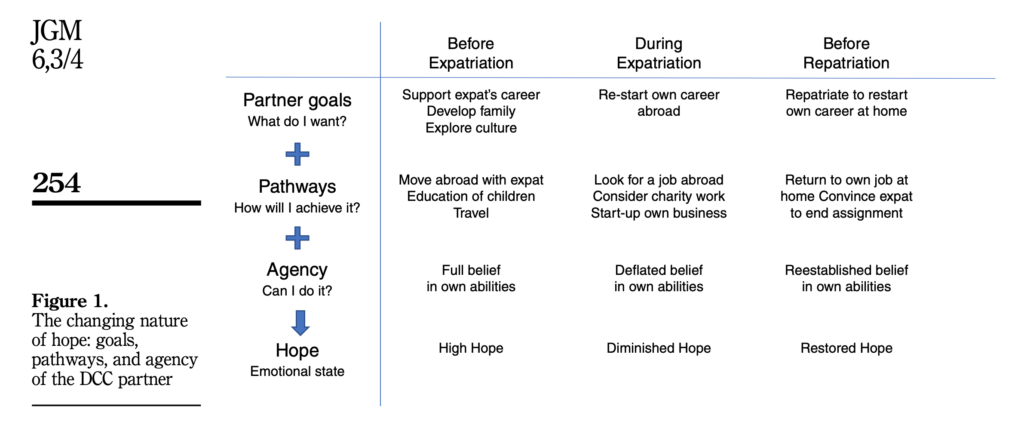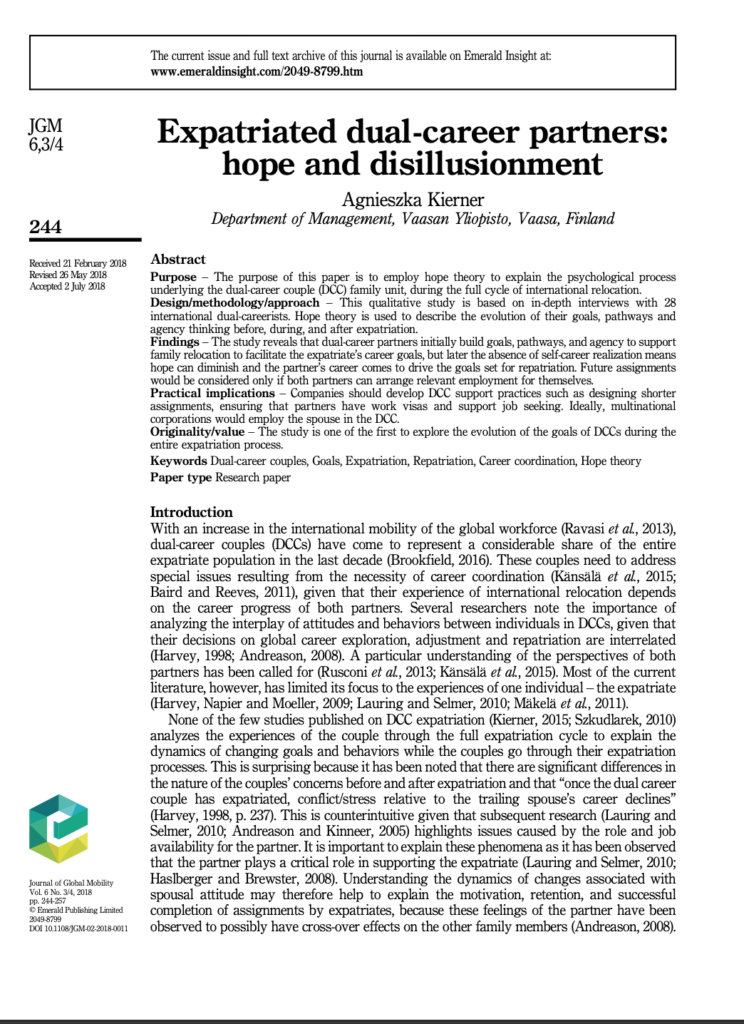
Expat Partner Career Planning:
Hope & Disillusion
Recently I stumbled upon one of the best, recent academic papers about Dual-Career Planning in expatriation. The paper „Expatriated dual-career partners: hope and disillusionment“ by Agnieszka Kierner perfectly illustrates how hope vanishes when career goals are not met during an international assignment. If you want to deep dive into the paper right away, follow this link or keep on reading my summary and point of view on this.
In the following, I want to highlight my take-aways and shed light on this very important topic that is still neglected by multinational companies and global HR partners.
What the paper is all about
The research analyzes how different the partners are feeling throughout the assignment about their personal career goals. While in the beginning, most partners are positive about their professional future and are very excited about the opportunity to live abroad, the reality kicks in during the time in the host country. Many spouses realize that their initial career goals are just not feasible and that they have to re-think their professional approach. Many are not finding work abroad, others are able to work but soon realize that this kind of work is often not fulfilling to the same degree and is not challenging enough. We are talking about part-time jobs that are often below the previous work experience in terms of responsibility, pay, creativity, and possibilities to develop further.
"The study reveals that dual-career partners initially build goals, pathways, and agency to support family relocation to facilitate the expatriate's career goals, but later the absence of self-career realization means hope can diminish and the partner's career comes to drive the goals set for repatriation."
The dual-career couple and the meaning of work
Here I would like to highlight the changed definition of Dual-Career-Couples that was portrait in the paper. Yes, of course, the pure definition is a married couple where both are working. While we can all agree that married can also be exchanged by a partnership, there is also a more interesting facet highlighted by several academics. Nowadays, Dual-Career Couples are also portrait as the following: Both partners are heavily invested in their careers because they offer the primary source of self-fulfillment. There is a high degree of psychological commitment to work. Hence, it is not only about needing a second income, but even more about the need for self-fulfillment through developing a career one is passionate about. So it is not only about the question of whether the partner can find work, but if he or she is able to find meaningful work that contributes to this.
"To ensure full adjustment, the DCC (dual-career-couple) partner would need to have meaningful employment that guarantees his/her career can progress."
Without a fulfilling job, many expat partners are feeling that they are not contributing enough. While their supporting role within the family is indispensable and the most important pillar for assignment success, it is hard to make this role more visible. When we are used to define ourselves partly on career success, it can be hard to shift focus away from that searching for fulfillment in other areas of our life. This becomes especially triggering when the partner realizes the mid- and long term effects on their career beyond the temporary time abroad. Often the consequence is a mix of negative, discouraging emotions that are mentioned in the paper such as frustration, exhaustion, the feeling of lack of importance and resignation.

If you are reading this as a fresh expat about to go on the job hunt abroad, please don’t be disillusioned! To every rule, there is an exception, and throughout my career as an expat partner coach, I have talked to multiple spouses who managed to find professional fulfillment abroad. However, I would like to stress that this is NOT a self-fulfilling prophecy, and it needs endurance and positive spirit to navigate this ship! So keep on reading! The best preparation is to know what might be ahead and see that your own development might be part of a bigger picture.
Hope & Disillusion throughout the expat cycle
I want to address the centerpiece of the paper and its findings: How your confidence, hopes, and goals are changing throughout the different phases of expatriation.


The Dual-Career Couples are full of hope when leaving for their expat assignment with clear goals in their head about what is important to them, what they want to accomplish, and how they want to approach this. However, observing their hopes and emotions over time, there can be seen a clear shift! The professional part of the partner gets more and more dominant, and the lack of creates a huge void. The paper’s author is beautifully portraying this development in three stages. From my own experience and coaching practice, I added my personal reflection on that:
Phase 1: Before Expatriation
Goals (What do i want?)
Most expectant expats are excited about the time ahead and curious to learn more about their new home, the new culture and how different their lifestyle could look like. Most of the time, the expat’s career is the reason for moving abroad, and the partner is entirely on board to support him/her in this new endeavor.
Pathways (How will I achieve it?):
The partner achieves this by focusing on setting a new infrastructure for the whole family, including schooling and housing. Also, Travel is an essential part of this new lifestyle to fully explore the new culture.
Agency (Can I do it?):
Full belief in own abilities. Partner’s start with an „I can do“ attitude, pushed by the excitement of experiencing something new and the still present acknowledgment of the previous job.
Hope (Emotional State):
Phase 2: During Expatriation
Goals (What do i want?)
Once settled in, expat partners are looking for ways to continue their very own career path. Often the arrival of the work permit is the go signal, or the newly created time in the daily schedule thanks to new routines.
Pathways (How will I achieve it?):
Expat partners are starting to research the local job market applying for suitable positions as well as considering charity work and part-time options in order to get a foot in the door. More and more partners are also considering to start their own business – (Expat-preneurship)
Agency (Can I do it?):
Rejections by the local job market and unforeseen barriers are deflating the belief in one’s own abilities. The partner is losing confidence and starts to take rejections personally.
Hope (Emotional State):
Phase 3: Before Repatriation
Goals (What do i want?)
The decision whether to stay or to go heavily builds on the career opportunities for the partner. In case he or she was not able to continue their career path, the new goal is often to repatriate to reestablish the professional identity.
Pathways (How will I achieve it?):
The goal of reestablishing the partner’s own career path is realized by bootstrapping the return back home and re-activating the local professional network.
Agency (Can I do it?):
The regained control of the situation equips the partner with a reestablished belief in one’s own abilities.
Hope (Emotional State):
"It appears that strong career orientation of the partners has been temporarily deprioritized elevating family goals."
Why is this topic still neglected?
Dual-career couples have become a considerable and indispensable share of the entire expat population in the last decade. There is also a direct and obvious correlation between assignment success and the job role of the supporting partner. The unfulfillment of the spouse is still the number one reason for an early return. These figures are staying the same, and most recent studies don’t show any change here. If any, the millennial generation is shedding more light on this and stress the role of the partner even more!
However, my experience tells me that global HR managers and companies are still neglecting this part! Although they are offering many pre-assignment support services such as language courses and cultural training, the support throughout the assignment is often not provided or only if the spouse is actively asking for it. I am still astonished by this, and I keep asking myself: How can it be that there is an obvious link between assignment success and partner’s career fulfillment, but no one seems to address this with the right amount of funding and attention that it should have. I was talking about this already in several other posts. Check out this article I have written for InterNations Business Solutions here or my direct appeal to companies why not to shy away from hiring expat partners.
Another factor to take into account is the likelihood of accepting another assignment abroad. The paper beautifully portraits the rejection of even very lucrative offer to reestablish the partner’s career. The likelihood of the partner having a job abroad becomes the Number 1 reason for accepting a foreign assignment and is no longer a wish but is developing to an explicit requirement in the negotiation process. So while the pull factor „expat’s career development“ is stagnating in importance, the pull factor „Spouse-career development“ is entering the stage.
"Even the expatriates themselves declare in their interviews, that the return of their partner's professional activity is the primary goal for repatriation."

What can be done by companies to improve the situation?
In order not to only complain about this misery but also offer solutions, I want to share what the paper by Agnieszka recommended companies to do:
- Designing shorter assignments
- Ensuring partners have work visas
- Support job-seeking
- For multinational corporations: Employ the spouse
I would love to add: Whatever you do, strengthen your support activities DURING the assignment and do not only focus on the time before moving abroad. The reason is simple. As the paper shows, hope, energy, and trust in one’s own skills are high before moving to the new country. However, this shifts after reality kicks in and dreams and hopes might be exchanged with frustration, feeling of inferiority, and cluelessness about the next potential step. When the time comes, and the expat partner starts to lose confidence in their skill-set, it is the time of a third party to step in and offer support. Equip the partner with coaching sessions, help with the job-seeking process by providing ongoing support over a more extended amount of time. By that, companies can reestablish the breeding ground for the highly needed energy expats needs to put themselves out there!
"Future assignments would be considered only if both partners can arrange relevant employment for themselves."
Congratulations to reading till the end! I hope you find this paper as useful as I do and that it brought you some perspective and inspiration for your current situation. I want to end this post on a very bride note: All expat partners interviewed in the paper have been able to re-enter the job market after repatriation. So even when you might struggle right now, there is light at the end of the tunnel! If you want to prepare yourself for your professional journey abroad or back home, take a look at my digital career workbook for deep-dive exercises and career consulting!
Thanks for sharing the love and stopping by












